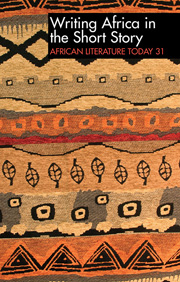Book contents
- Frontmatter
- Dedication: Chinua Achebe Joins the Ancestors
- Stop Press/ Tribute to Kofi Awoonor 1935–2013
- Contents
- Notes on Contributors
- Editorial Article
- Articles
- “Real Africa”/“Which Africa?”: The Critique of Mimetic Realism in Chimamanda Ngozi Adichie's Short Fiction
- Writing Apartheid: Miriam Tlali's Soweto Stories
- Articulations of Home & Muslim Indentity in the Short Stories of Leila Aboulela
- Ugandan Women in Contest with Reality: Mary K. Okurutu's A Women's Voice & the Women's Future
- Snapshots of the Botswana Nation: Bessie Head's The Collector of Treasures & Other Botswana Village Tales as a National Project
- Widowhood – Institutionalized Dead Weight to Personal Identity & Dignity: A Reading of Ifeoma Okoye's The Trial & Other Stories
- Feminist Censure of Marriage in Islamic Societies: A Thematic Analysis of Alifa Rifaat's Short Stories
- Diaspora Identities in Short Fiction by Chimamanda Ngozi Adichie & Sefi Atta
- Exposition of Apartheid South African Violence & Injustice in Alex la Guma's Short Stories
- Locating a Genre: Is Zimbabwe a Short Story Country?
- Mohammed Dib's Short Stories on the Memory of Algeria
- Ama Ata Aidoo's Short Stories: Empowering the African Girl-Child
- Ama Ata Aidoo: an Interview for ALT
- Reviews
Diaspora Identities in Short Fiction by Chimamanda Ngozi Adichie & Sefi Atta
from Articles
Published online by Cambridge University Press: 05 December 2013
- Frontmatter
- Dedication: Chinua Achebe Joins the Ancestors
- Stop Press/ Tribute to Kofi Awoonor 1935–2013
- Contents
- Notes on Contributors
- Editorial Article
- Articles
- “Real Africa”/“Which Africa?”: The Critique of Mimetic Realism in Chimamanda Ngozi Adichie's Short Fiction
- Writing Apartheid: Miriam Tlali's Soweto Stories
- Articulations of Home & Muslim Indentity in the Short Stories of Leila Aboulela
- Ugandan Women in Contest with Reality: Mary K. Okurutu's A Women's Voice & the Women's Future
- Snapshots of the Botswana Nation: Bessie Head's The Collector of Treasures & Other Botswana Village Tales as a National Project
- Widowhood – Institutionalized Dead Weight to Personal Identity & Dignity: A Reading of Ifeoma Okoye's The Trial & Other Stories
- Feminist Censure of Marriage in Islamic Societies: A Thematic Analysis of Alifa Rifaat's Short Stories
- Diaspora Identities in Short Fiction by Chimamanda Ngozi Adichie & Sefi Atta
- Exposition of Apartheid South African Violence & Injustice in Alex la Guma's Short Stories
- Locating a Genre: Is Zimbabwe a Short Story Country?
- Mohammed Dib's Short Stories on the Memory of Algeria
- Ama Ata Aidoo's Short Stories: Empowering the African Girl-Child
- Ama Ata Aidoo: an Interview for ALT
- Reviews
Summary
The African short story has come of age in the twenty-first century through the creative artistry of younger generation African women writers such as Chimamanda Ngozi Adichie and Sefi Atta. As leading women writers of both novels and short fiction, their literature chronicles a new reality of social change and modernity that transforms the lives of African women within a global arena. Since the turn of the century, their fiction mirrors the lives of contemporary African women who grapple with challenges of migration and displacement, and the impact of globalization. Chimamanda Ngozi Adichie's short story collection The Thing Around Your Neck (2009) and News from Home (2010) by Sefi Atta reflect the evolution of the African short story in subject and theme. A noteworthy feature of leading stories in both collections is the emergence of African diaspora identities that are ambiguous and disjointed.
In the postmodern era, African women's identities are changing and they must overcome new social and economic forces in addition to familiar barriers like patriarchy and traditional norms and customs. Globalization has thrust African women beyond the boundaries of the motherland into a world where they must renegotiate their existence in an alien western environment. This essay examines the exploration of diaspora identities of African women in selected short fiction by Chimamanda Ngozi Adichie and Sefi Atta. Diaspora experiences take centre stage through connecting themes of hybridity, clash of cultures and alienation.
- Type
- Chapter
- Information
- Writing Africa in the Short Story , pp. 102 - 114Publisher: Boydell & BrewerPrint publication year: 2013

